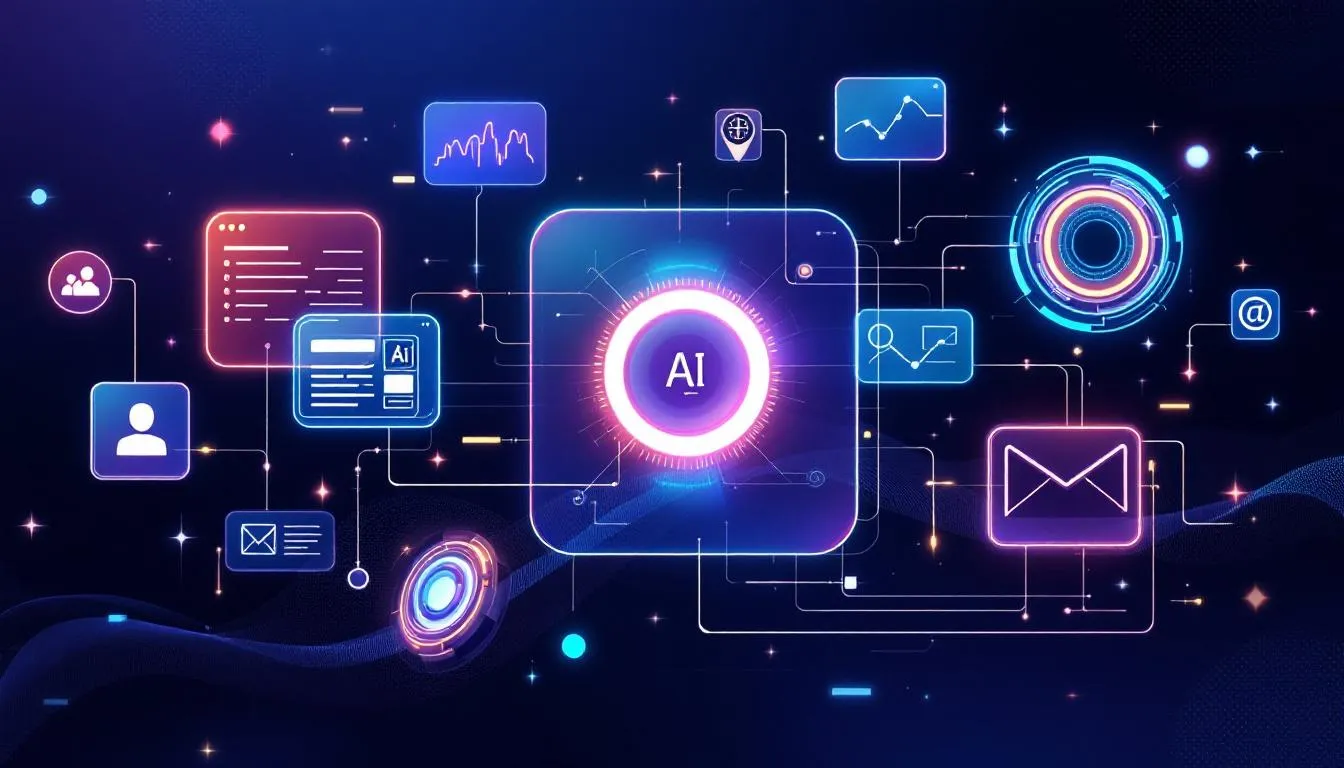02 Sep How AI is Changing Digital Marketing: Trends to Watch in 2025
AI in digital marketing is transforming how businesses engage with their audiences. By automating tasks, providing real-time insights, and enhancing personalisation, AI tools are making marketing more efficient and effective. This article explores the key trends and tools reshaping the industry and how you can leverage AI to boost your marketing strategy in 2025.
Key Takeaways
- AI is revolutionising digital marketing by enabling real-time adaptability, automation of routine tasks, and enhanced data-driven decision-making, leading to optimised engagement and better business outcomes.
- Popular AI tools like chatbots, content creation platforms, and predictive analytics streamline marketing efforts, improve customer interactions, and provide valuable insights for personalised strategies.
- Future trends in AI marketing highlight the importance of generative AI innovations and real-time consumer insights, driving faster, more effective campaigns and deeper customer engagement.
Understanding AI in Digital Marketing

AI has evolved from a mere concept in science fiction to a game-changing technology in the marketing world. At its core, AI in digital marketing refers to the use of advanced algorithms and machine learning models to analyse vast amounts of data, automate tasks, and predict consumer behaviour. This evolution has empowered businesses to enhance engagement, boost conversion rates, and drive profit growth by providing actionable insights from extensive data analysis.
One of the most significant advantages of AI is its ability to enable real-time adaptability in marketing strategies. Imagine being able to adjust your marketing campaigns instantaneously based on the latest consumer interactions. This capability allows marketers to stay ahead of trends and respond to customer needs more effectively, thereby optimising engagement and satisfaction. The integration of AI facilitates better data-driven decision-making, which is crucial for crafting campaigns that resonate with target audiences.
Moreover, AI significantly improves the efficiency of marketing operations by automating routine tasks that would otherwise consume valuable time and resources. From managing email lists to scheduling social media posts, AI tools can handle these repetitive tasks with precision, freeing up marketers to focus on strategic planning and creative endeavours. This shift towards automating marketing tasks not only enhances productivity but also ensures that marketing efforts are consistently aligned with the latest data insights.
Marketing professionals who embrace AI technologies are at the forefront of a rapidly changing marketing industry. Leveraging AI allows them to gain deeper insights into customer behaviour, tailor marketing strategies more effectively, and achieve better business outcomes, positioning them as marketing leaders.
Exploring the specific AI tools and strategies revolutionising digital marketing will reveal how to harness this powerful technology to transform your marketing efforts.
Popular AI Tools for Marketers

AI tools have become indispensable in the digital marketing toolkit, offering solutions that range from content creation to customer engagement and data analysis. These tools are designed to enhance various marketing tasks, making processes more efficient and effective. For instance, popular platforms include:
- HubSpot
- Constant Contact
- Mailchimp
- ActiveCampaign
These platforms are widely used to automate tasks and optimise campaigns, streamlining the workflow for marketing teams.
Marketers today utilise AI tools for a diverse array of functions, including market research, report creation, and idea demonstration. Companies such as Adidas and Netflix have successfully implemented AI in their marketing strategies, underscoring the technology’s versatility and efficacy. Adobe Sensei, for example, is an innovative AI tool that provides features like data analysis and predictive modelling, enabling marketers to make informed decisions based on actionable insights.
Another example of an AI tool that has gained popularity is Gumloop, which integrates AI with automation to offer seamless connections between various digital marketing tools without the need for coding. Notion AI enhances productivity by providing instant answers and assistance within its workspace, making it a valuable asset for teams. Jasper AI and Surfer are particularly renowned for their capabilities in creating different types of copy, making them favoured tools among content marketers.
The following subsections explore specific AI tools essential in various aspects of digital marketing. From chatbots that revolutionise customer interactions to content creation tools that spark creativity and predictive analytics platforms that tailor marketing strategy, each of these tools plays a crucial role in modern marketing campaigns.
Chatbots and Virtual Assistants
AI-driven chatbots and virtual assistants have revolutionised the way businesses interact with their customers. These AI technologies provide instant answers to simple queries, enabling continuous interaction with brands and significantly enhancing customer experiences. The adaptability of AI-powered chatbots is particularly noteworthy—they learn from diverse customer inquiries beyond their initial programming, thus offering a more personalised and responsive service.
In the realm of e-commerce, AI chatbots have been shown to significantly enhance online shopping experiences by personalising interactions based on user data. This personalisation extends to recommending products and completing transactions, which not only improves customer engagement but also drives sales. According to recent data, 31% of marketers are using AI for brand chatbots, with 71% utilising two or more chatbots within their marketing strategies.
The growing adoption of these technologies is evident, with marketers using an average of 2.41 chatbots, indicating their effectiveness and popularity in digital marketing. Advanced chatbots and virtual assistants are now capable of handling a wide range of customer queries, recommending products, and even completing transactions, which greatly enhances customer engagement and satisfaction.
As these AI-driven tools become more sophisticated, their ability to provide seamless customer service will only improve, making them an integral part of any comprehensive digital marketing strategy. Leveraging AI technologies like chatbots and virtual assistants ensures efficient and deeply personalised customer interactions, fostering stronger relationships and loyalty.
Content Creation Tools
AI has brought a wave of innovation to content creation, enabling marketers to generate a wide variety of content quickly and efficiently. From captions and social media posts to email copy and blog articles, AI tools can create text-based content that is concise, relevant, and engaging. Tools like Grammarly and Quillbot are excellent examples, enhancing the quality of written content by ensuring clarity and correctness. Additionally, platforms like StoryChief offer comprehensive content strategies and insights, helping marketers to plan and execute their content marketing effectively.
A significant portion of marketers—55% to be exact—rely on AI for text-based content creation. This reliance is driven by the time and cost savings that AI provides, allowing marketers to generate content rapidly without compromising quality. AI tools are also viewed as assistive, sparking creativity by providing a starting point for ideation and formulation of marketing content.
The ability to generate high-quality content at scale is a game-changer for content marketing, enabling businesses to maintain a consistent and engaging online presence. As AI tools continue to evolve, their capabilities will expand, offering even more sophisticated solutions for content creation and AI-generated content. This evolution will empower marketers to focus more on strategic planning and creative execution, knowing that the technical aspects of content generation are well-handled by AI.
Predictive Analytics Platforms
Predictive analytics platforms represent one of the most powerful applications of AI in digital marketing. These tools utilise historical data to provide actionable insights that can effectively tailor marketing strategies. By analysing vast amounts of data, AI can predict the outcomes of marketing campaigns and assets, allowing marketers to make informed decisions that optimise their efforts.
One of the key benefits of predictive analytics is its ability to facilitate real-time messaging adjustments. AI can quickly identify emerging trends and adjust marketing messages accordingly, ensuring that campaigns remain relevant and engaging. This capability extends beyond broad demographics, providing more precise and actionable data that helps in crafting targeted marketing strategies.
As we move forward, the integration of predictive analytics into marketing strategies will become increasingly sophisticated, offering deeper insights and more refined targeting. This advancement will enable marketers to gain insights to anticipate consumer behaviour more accurately, enhancing the effectiveness of their campaigns and driving better results. Additionally, marketing analytics will play a crucial role in this evolution.
Enhancing Customer Engagement with AI

Customer engagement is at the heart of effective marketing, and AI is revolutionising how brands interact with their audiences. By providing personalised recommendations based on individual preferences, AI significantly improves customer interactions. This personalisation not only enhances the customer experience but also streamlines the buying process, making it more intuitive and satisfying.
AI’s ability to predict consumer behaviour through real-time data analysis allows marketers to develop more personalised marketing strategies. For instance, AI-driven analytics tools enable:
- Real-time adjustments to marketing strategies based on immediate insights
- Optimisation of engagement
- Ensuring that campaigns are always aligned with current consumer preferences
This dynamic approach to marketing is essential for maintaining high levels of enhanced customer engagement and loyalty.
AI solutions offer several advantages for marketers:
- Analyse user interactions to refine social media strategies and improve engagement.
- Accelerate the market research process, providing quick access to insightful trends.
- Allow marketers to stay ahead of the competition.
- Enable real-time adjustment of campaigns based on emerging consumer trends and behaviours, which is a significant advantage in today’s fast-paced digital landscape.
The following subsections explore how AI provides personalised recommendations and dynamic content personalisation, both crucial for enhancing customer engagement.
Personalised Recommendations
AI is reshaping marketing by enabling hyper-personalisation, allowing brands to tailor experiences based on individual customer preferences. This level of personalisation involves tailoring content based on customer actions and preferences, with AI tools adapting over time to provide increasingly relevant recommendations. The result is enhanced customer engagement and satisfaction, as customers feel understood and valued by the brand.
Predictive analytics powered by AI allows companies to anticipate customer actions, which enhances engagement strategies by providing timely and relevant offers. AI uses algorithms to group customers with similar interests and behaviours, streamlining operations and providing real-time customer assistance that enhances experiences. This capability is particularly evident in AI recommendation systems, which analyse browsing history and purchase patterns to suggest products that align with individual preferences.
Real-time analysis of customer interactions allows AI to customise offers and improve engagement. For example, AI can provide product suggestions based on individual preferences and purchase history, creating a more personalised shopping experience. These insights enable marketers to create more effective and engaging campaigns that resonate with their target audience.
Dynamic Content Personalisation
Dynamic content personalisation is another crucial application of AI in digital marketing. Unlike static content, dynamic content adapts based on real-time user behaviour and preferences, providing a more personalised experience. For instance, the AI model in CommBank’s Yello learns user preferences and improves offers accordingly, phasing out offers that do not interest the user. This adaptability ensures that the content remains relevant to the user, enhancing their engagement and satisfaction.
AI analyses user behaviour to deliver personalised marketing experiences, which 60% of marketers believe significantly enhances customer experiences. This dynamic approach involves changing content based on variables such as the user’s name, occupation, and online behaviour. Tools like 6Sense are excellent examples of AI solutions that enhance content personalisation by continuously adapting to user interactions.
Dynamic content personalisation ensures that marketing efforts align with the evolving preferences and behaviours of the audience. This real-time adaptability is crucial in maintaining high levels of customer engagement and loyalty, ultimately driving better business outcomes.
AI-Powered Marketing Strategies

AI has the potential to revolutionise marketing strategy. It does this by utilising its analytical, technological, and strategic capabilities. AI analytics platforms enhance marketing decision-making through data-driven insights and real-time adjustments. This strategic, systematic approach considers both opportunities and risks, ensuring successful AI implementation in digital marketing. Companies like Pattern89 use AI tools to provide recommendations on ad spend and targeting, improving overall campaign performance.
AI-powered data insights facilitate marketing campaigns’ success by offering actionable recommendations based on audience engagement and behaviour. For instance, AI tools enhance media buying effectiveness by recommending optimal ad placements and managing ad spend. This increased audience targeting efficiency helps expand reach and improve engagement. For more digital marketing insights, explore trends and strategies shared by industry experts.
Moreover, leveraging real-time data enables faster and more informed decision-making, allowing businesses to maintain a competitive edge. AI-driven agents also play a crucial role in automating routine marketing tasks, improving efficiency by handling tasks like data entry, report generation, and email scheduling. This automation frees up time for marketers to focus on strategic planning and creative execution, driving innovation and better results.
As we explore specific AI-powered marketing strategies in the subsections, we’ll see how automated email campaigns, social media management, and SEO optimisation are transformed by AI.
Automated Email Campaigns
Automated email campaigns are one of the most effective applications of AI in digital marketing. AI improves the efficiency of email marketing by saving time on research and enhancing the success of campaign sending. AI tools create personalised marketing messages, enabling marketers to resonate with targeted customer segments and increase conversion rates.
AI also automates the process of managing email lists by curating recipients based on behaviour metrics to determine value and optimise engagement. This automation ensures that EDMs are not only efficient but also highly targeted, maximising their impact and effectiveness.
AI-driven email marketing enables businesses to deliver more relevant and engaging content, driving better results and higher ROI.
Social Media Management
Social management is another area where AI is making a significant impact. AI offer various solutions, including:
- Blaze, which helps schedule social media posts and create content calendars, streamlining the process for marketing teams
- Tools that manage social media campaigns by scheduling posts
- Tools that analyse engagement metrics
AI tools have become essential in managing social media campaigns.
By automating routine tasks, AI frees up time for marketers to focus on creating engaging content and interacting with their audience. This automation also ensures that social media campaigns are consistently aligned with the latest data insights, optimising engagement and performance.
As a result, businesses can maintain a strong and active presence on social media platforms through social media marketing, driving better engagement and brand loyalty.
SEO Optimisation
SEO optimisation is a critical aspect of digital marketing, and AI is transforming how it’s done. AI enhances search engine optimisation (SEO) by:
- Automating keyword research
- Optimizing content
- Analysing user behaviour
- Creating meta tags
- Predicting SEO trends
Tools like Keyword Insights integrate keyword research, SEO best practices, and writing, providing a comprehensive solution for content optimisation.
AI utilises methodologies such as analysing user behaviour and optimising for voice and visual search to improve SEO. AI algorithms can analyse click-through rates, conversion rates, and consumer engagement metrics to measure performance, providing key insights for optimisation using AI software.
Tools like Surfer SEO assist in enhancing content for better search engine rankings by analysing and scoring based on keyword usage and structure. AI-driven SEO optimisation ensures content is always optimised for search engines, driving more organic traffic and improving online visibility.
Leveraging AI for Data Analysis
AI plays a critical role in digital marketing by:
- Improving insight generation through advanced data collection, natural language processing, and analytics.
- Enhancing decision-making and asset creation by analysing marketing data.
- Handling larger datasets in real-time with AI analytics.
- Enabling the identification of complex patterns that traditional analysis may miss.
These capabilities ultimately drive better marketing activity results.
Processing large datasets with AI enables marketers to:
- Make data-driven decisions, optimising strategies for better performance and ROI.
- Gain extensive insights for evaluating marketing performance.
- Measure campaign effectiveness effectively.
Additionally, high-quality input and clean data are crucial for AI to deliver accurate insights and gain insights for effective decision-making.
Effective use of AI relies on accessible data, which allows marketers to gather key insights and model customer behaviours. With 66% of marketers believing that AI provides insights they cannot find otherwise, the value of AI in uncovering hidden patterns is evident. The following subsections highlight how AI enhances customer behaviour analysis and market research.
Customer Behaviour Analysis
Understanding customer behaviour is essential for effective marketing, and AI tools provide valuable insights into customer preferences, motivations, and purchasing behaviour. Predictive analytics enables the prediction of customer actions, such as opening emails or making purchases, allowing marketers to tailor their strategies accordingly.
Demand forecasting incorporates historical sales data, market trends, and consumer buying patterns, helping businesses anticipate future demand and adjust their marketing efforts to forecast consumer behaviour. However, companies may struggle to produce reliable insights if they do not collect enough data.
AI-driven customer behaviour analysis provides businesses with a deeper understanding of their audience segmentation, enhancing engagement and driving better results.
Market Research Enhancement
AI technologies enhance market research by allowing companies to gather insights more quickly and accurately. To improve the accuracy of market research results, it’s essential to mitigate data bias in AI applications. Companies should audit their AI systems and ensure they use representative data sets to combat data bias.
This enhancement in market research allows businesses to stay ahead of market trends and make informed decisions that drive growth. AI-driven market research allows companies to gather valuable insights, informing marketing strategies and improving their competitive edge.
Ethical Considerations in AI Marketing
As AI becomes more integral to digital marketing, it’s crucial to address the ethical concerns associated with its use. Key ethical concerns include data privacy, security, consumer trust, and AI bias. Organisations must prepare for challenges related to algorithm bias and data privacy concerns in AI marketing. Establishing clear policies and guidelines is essential for promoting responsible AI use in marketing.
Building an ethical AI marketing strategy requires:
- Transparent data practices
- Compliance with data privacy regulations
- Balancing the benefits of AI in marketing with its potential negative impacts to ensure ethical adoption
One significant concern is the potential elimination of entry-level jobs in marketing due to automation.
Additionally, there are worries about AI producing plagiarised information, impacting content originality, and ethical issues arising from AI models trained on copyrighted material. Addressing these ethical considerations ensures responsible AI practices and maintains consumer trust.
The following subsections delve into data privacy and mitigating algorithm bias.
Data Privacy
Data privacy is a key ethical concern related to AI in marketing that marketers must prioritise. Companies have an obligation to provide transparency around customer data usage and ensure data privacy. The General Data Protection Regulation (GDPR) is a vital regulation that protects consumer data across the EU.
The urgency created by the use of large volumes of data in generative AI has increased the need for robust data privacy measures. Marketers should ensure that AI marketing tools they select comply with data privacy criteria, legal terms, and ethical policies.
Implementing licensing deals for data use can enhance data privacy in AI applications. Establishing clear opt-in/opt-out mechanisms can help maintain data privacy in AI marketing. Transparency and clear explanations about AI systems help marketers build trust and maintain ethical standards.
Mitigating Algorithm Bias
Algorithm bias occurs when an AI system produces results that are systematically prejudiced due to flawed assumptions in the machine learning process. If not addressed, algorithm bias can lead to unfair treatment of individuals or groups, adversely impacting decision-making processes in marketing. Regular auditing of AI algorithms is essential to identify and rectify biases, ensuring they function equitably across diverse populations.
Implementing measures such as diverse training data and continuous monitoring can help mitigate bias and promote fairness in AI systems. Addressing algorithm bias ensures ethical and inclusive AI practices, fostering trust and fairness in marketing efforts.
Building an AI-Ready Marketing Team
To succeed in the AI-driven landscape of digital marketing, marketers should:
- Know how to use AI effectively.
- Master the use of AI to future-proof their careers.
- Experiment with available tools to build their AI expertise.
- Pay attention to the impact of AI on various roles and tasks while building AI expertise.
Marketers identify data privacy concerns as a significant obstacle to AI adoption. This issue is highlighted as one of the primary barriers. A key concern regarding the automation of marketing tasks is how to nurture new talent in marketing as entry-level tasks become automated. By addressing these challenges, businesses can build a marketing team that is well-equipped to leverage AI technologies and drive innovation.
Training and Reskilling
Technical expertise is essential for successful AI integration and optimising tools for better marketing outcomes. Aligning AI technology with business and career goals ensures that marketing professionals can deliver organisational objectives effectively. Reskilling and staying updated with changes in AI technology are crucial for a marketing professional’s career longevity.
Ongoing training and support for employees are key to successfully integrating AI in marketing practices. Training and time investment concerns are major barriers to effective AI implementation in marketing. Companies can use various methods such as course stipends, AI tool subscriptions, and internal training programs to support AI training and development.
Training in AI-driven natural language generation tools can empower marketers to create personalised email campaigns, product descriptions, and social media posts. The Transforming Strategies with Generative AI program provides hands-on training in AI tools, focusing on real-world applications.
Change Management Strategies
Implementing AI in marketing requires effective change management strategies:
- Start small with simple applications and assess results before scaling.
- Gradually iterate and expand the selection of AI tools for manageable and sustainable integration.
- Create a culture of AI innovation by obtaining feedback, celebrating successes, and learning from setbacks.
Adopting these strategies ensures a smooth transition to AI-driven marketing practices, fostering continuous improvement and innovation.
Future Trends in AI Marketing

The future of AI in marketing is filled with exciting possibilities:
- AI technologies can predict SEO trends, allowing marketers to adjust their strategies proactively.
- AI will enhance personalisation through data-driven decision-making for tailored marketing campaigns.
- With 74% of US marketers having adopted AI in their roles, substantial investment and integration are evident. (Source: HubSpot, 2024; Digital Marketing Institute, 2024)
AI enables campaigns to launch in days or hours, significantly impacting campaign speed and efficiency. Metrics such as ROI, time saved, and productivity should be monitored to evaluate AI implementations. As AI continues to evolve, its capabilities in improving customer segmentation, personalisation, and real-time data analysis will transform how brands engage with consumers.
The following subsections discuss future trends in generative AI innovations and real-time consumer insights.
Generative AI Innovations
Generative AI in marketing uses advanced machine learning to create original content from large amounts of data. Mastering AI skills enhances career prospects for marketing professionals and leads to greater success. Marketers can utilise generative AI to accomplish more in less time, creating social media posts, turning images into memes, and responding via chatbots.
Generative AI is expected to evolve by producing various types of content, including videos, music, and more, beyond just text. Future capabilities anticipated for generative AI tools in content production include the ability to produce nuanced content like videos and music. This evolution will enable marketers to create more engaging and diverse content, driving better engagement and results.
Real-Time Consumer Insights
Real-time data analysis is becoming increasingly vital for marketers as it allows for immediate insights into consumer behaviour and preferences. Using real-time data offers brands the opportunity to adapt their marketing strategies based on immediate consumer responses. Predictive analytics can process real-time data to forecast trends, helping marketers to shape future strategies that align with consumer expectations.
As technology evolves, the integration of AI in real-time data analysis will continue to transform how brands engage with consumers. By leveraging real-time consumer insights, businesses can ensure that their marketing efforts are always aligned with the latest trends and consumer preferences, driving better engagement and results.
Summary
In summary, AI is revolutionising digital marketing by enhancing customer engagement, optimising marketing strategies, and providing valuable insights through data analysis. From chatbots and content creation tools to predictive analytics platforms, AI tools are transforming how marketers interact with their audiences and execute their campaigns.
Ethical considerations, such as data privacy and algorithm bias, are crucial for responsible AI adoption. By addressing these concerns and building an AI-ready marketing team, businesses can leverage AI technologies to drive innovation and achieve better results.
As we look to the future, generative AI innovations and real-time consumer insights will continue to shape the landscape of digital marketing. By staying ahead of these trends, marketers can ensure their strategies remain effective and relevant, ultimately driving growth and success in an AI-driven world.
Frequently Asked Questions
What are the main benefits of using AI in digital marketing?
Utilising AI in digital marketing significantly boosts customer engagement and streamlines your strategies, allowing for valuable insights and automation of routine tasks. This leads to a more adaptive and effective marketing approach, ensuring your efforts yield better results.
How do AI tools improve content creation for marketers?
AI tools significantly enhance content creation for marketers by improving writing quality and providing valuable insights, allowing for faster and more cost-effective content generation. Embracing these technologies can elevate your marketing efforts and streamline your workflow.
What ethical considerations should marketers keep in mind when using AI?
Marketers should prioritise data privacy, security, and transparency while ensuring AI systems are regularly audited to prevent bias. By focusing on these ethical considerations, they can foster consumer trust and build a positive brand image.
How can businesses build an AI-ready marketing team?
To build an AI-ready marketing team, businesses should prioritise training, reskilling, and fostering a culture of experimentation with AI tools. By addressing data privacy and nurturing new talent, they can create a dynamic team ready to leverage AI effectively.
What future trends in AI marketing should marketers watch for?
Future trends in AI marketing to watch include generative AI, real-time consumer insights, enhanced personalisation, and predictive analytics. Embracing these innovations will empower marketers to create more effective and relevant strategies!



Sorry, the comment form is closed at this time.